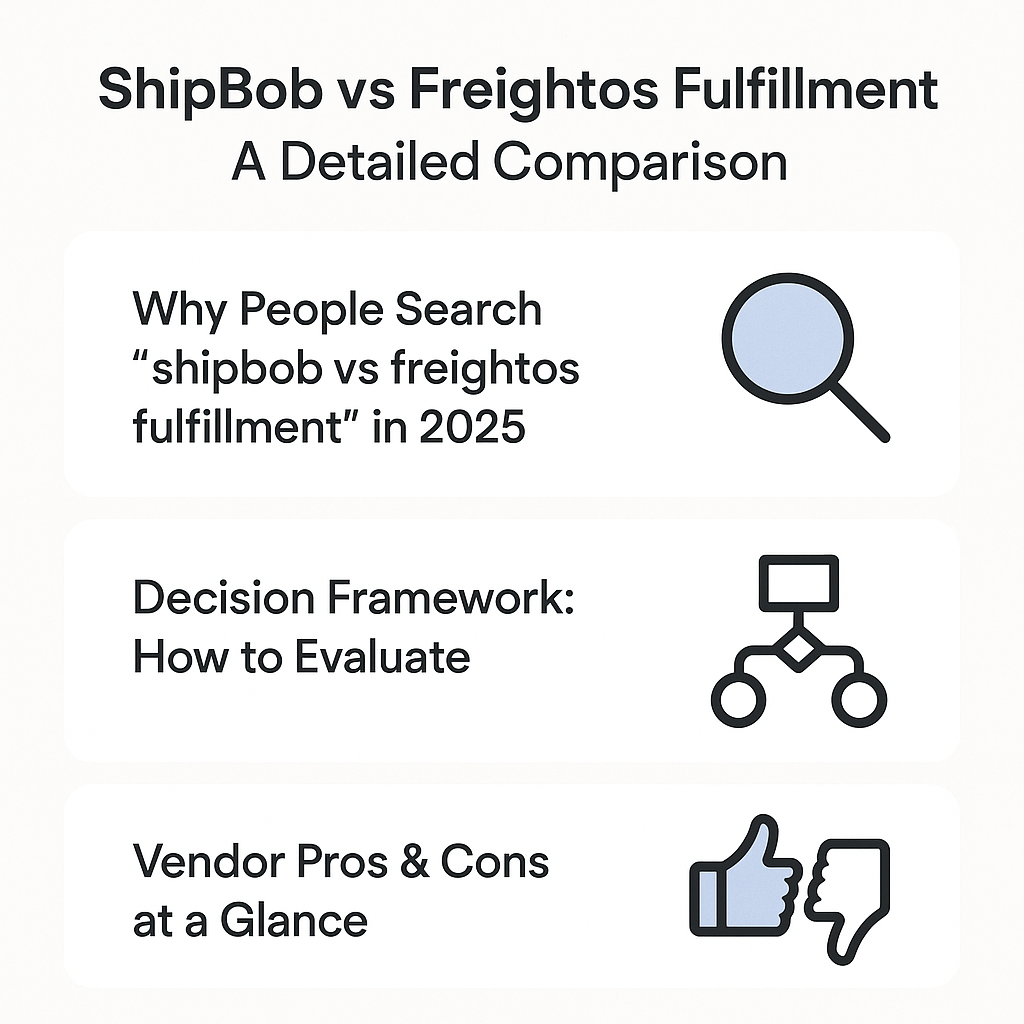
ShipBob vs Freightos Fulfillment
In the ever-evolving world of logistics, choosing the right third-party logistics (3PL) provider is crucial. As businesses scale, the decision between ShipBob and Freightos Fulfillment becomes more critical. This guide will help you navigate the complexities of these two options, ensuring you make a confident and informed choice.
Why People Search ‘shipbob vs freightos fulfillment’ in 2025
As we move further into 2025, the logistics landscape is increasingly shaped by technological advancements and shifting consumer expectations. Businesses are more focused on sustainability, AI-driven forecasting, and the ability to scale efficiently. This context makes the comparison between ShipBob and Freightos Fulfillment particularly relevant. Both companies offer unique solutions, but their approaches to technology, cost, and service can vary significantly.
- Understand the role of AI in logistics for predictive analytics and inventory management.
- Consider sustainability practices and how they align with your brand values.
- Evaluate the scalability of each provider to match your growth trajectory.
Decision Framework: How to Evaluate
Choosing between ShipBob and Freightos Fulfillment requires a clear understanding of your business needs. Start by assessing your current logistics challenges and future goals. Consider factors such as delivery speed, geographic coverage, and technological integration. Each provider has strengths that may align differently with your priorities.
For instance, if rapid delivery is critical, evaluate how each provider’s network can meet those demands. Alternatively, if cost efficiency is paramount, delve into their pricing structures to uncover potential savings.
- Map out your logistics priorities: speed, cost, technology, and coverage.
- Assess each provider’s ability to integrate with your existing systems.
- Consider the flexibility of each provider to adapt to market changes.
Vendor Pros & Cons at a Glance
- ShipBob:
- Pros: Strong technology integration, extensive warehouse network, excellent customer support.
- Cons: Higher costs for small businesses, limited international reach.
- Freightos Fulfillment:
- Pros: Competitive pricing, robust international logistics capabilities, flexible shipping options.
- Cons: Less intuitive technology platform, variable customer service experience.
ShipBob excels in technology and customer support, making it ideal for tech-savvy businesses that prioritize domestic reach. Freightos Fulfillment offers a cost-effective solution with strong international capabilities, though it may require more effort to integrate technologically.
Pricing & Total Landed Cost: What Really Moves the Number
Pricing is a critical factor when choosing between ShipBob and Freightos Fulfillment. Understanding the total landed cost, which includes all expenses from production to delivery, is essential. Both providers offer different pricing models that can significantly impact your bottom line.
- ShipBob typically charges higher fees for warehousing and technology integration, which can be offset by efficiency gains.
- Freightos Fulfillment offers competitive rates, particularly for international shipping, but may have additional costs for technology upgrades.
- Consider volume discounts and contract terms that could influence overall costs.
While ShipBob’s costs may be higher upfront, the efficiency and support can lead to long-term savings. Freightos Fulfillment’s pricing is attractive for businesses with significant international shipping needs, though hidden costs should be monitored.
Feature-by-Feature Comparison
- Technology Integration:
- ShipBob: Advanced API and platform integrations.
- Freightos: Basic integrations, with some customization needed.
- Geographic Coverage:
- ShipBob: Strong U.S. presence, limited international.
- Freightos: Extensive international network, moderate U.S. coverage.
- Customer Support:
- ShipBob: Highly rated, responsive support team.
- Freightos: Mixed reviews, with variable response times.
ShipBob stands out for its technology and customer support, making it a strong choice for businesses focused on domestic operations. Freightos Fulfillment offers broader international reach, suitable for companies with global ambitions, though it may require more hands-on management.
Scenario Playbook: Who Should Choose What?
- If your business is primarily U.S.-based and relies heavily on technology, ShipBob is likely the better choice.
- For companies with a significant international customer base, Freightos Fulfillment offers the necessary global logistics capabilities.
- Consider ShipBob if you value strong customer support and seamless technology integration.
Onboarding & Risk Mitigation
Successful implementation of a 3PL provider involves careful planning and risk management. Both ShipBob and Freightos Fulfillment offer onboarding processes, but the experience can differ.
ShipBob provides a structured onboarding process with dedicated support, ensuring a smooth transition. Freightos Fulfillment offers flexibility, allowing businesses to tailor the onboarding to their specific needs, though this may require more internal resources.
- Prepare a detailed implementation plan with timelines and responsibilities.
- Engage with the provider’s support team early to address potential challenges.
- Monitor key performance indicators (KPIs) during the initial phase to ensure alignment with expectations.
Expert Take
Having worked with both ShipBob and Freightos Fulfillment, I’ve seen firsthand how each provider can transform logistics operations. One client, a mid-sized ecommerce retailer, chose ShipBob for its robust technology and domestic reach, which resulted in a 20% increase in delivery speed. Conversely, a global distributor found Freightos Fulfillment’s international capabilities invaluable, allowing them to expand into new markets with ease. Ultimately, the choice hinges on aligning your logistics strategy with the provider’s strengths.
Further Reading
FAQs
How do pricing models differ for ‘shipbob vs freightos fulfillment’?
ShipBob generally has higher upfront costs but offers efficiency gains, while Freightos Fulfillment provides competitive international rates with potential hidden costs.
What support model should I expect?
ShipBob offers responsive, highly-rated support, whereas Freightos Fulfillment’s support can vary in responsiveness.
Which industries benefit most?
ShipBob is ideal for tech-driven, U.S.-focused businesses, while Freightos Fulfillment suits companies with global distribution needs.
How long does onboarding take?
ShipBob offers a structured onboarding process, typically faster, while Freightos Fulfillment allows for a more customized, potentially longer setup.
Can multi-node reduce both cost and transit time?
Yes, using multiple nodes can optimize transit times and reduce costs by strategically placing inventory closer to demand centers.
Next Steps
Ready to make a decision? Compare quotes or schedule a consultation to find the best fit for your logistics needs.

Leave a Reply